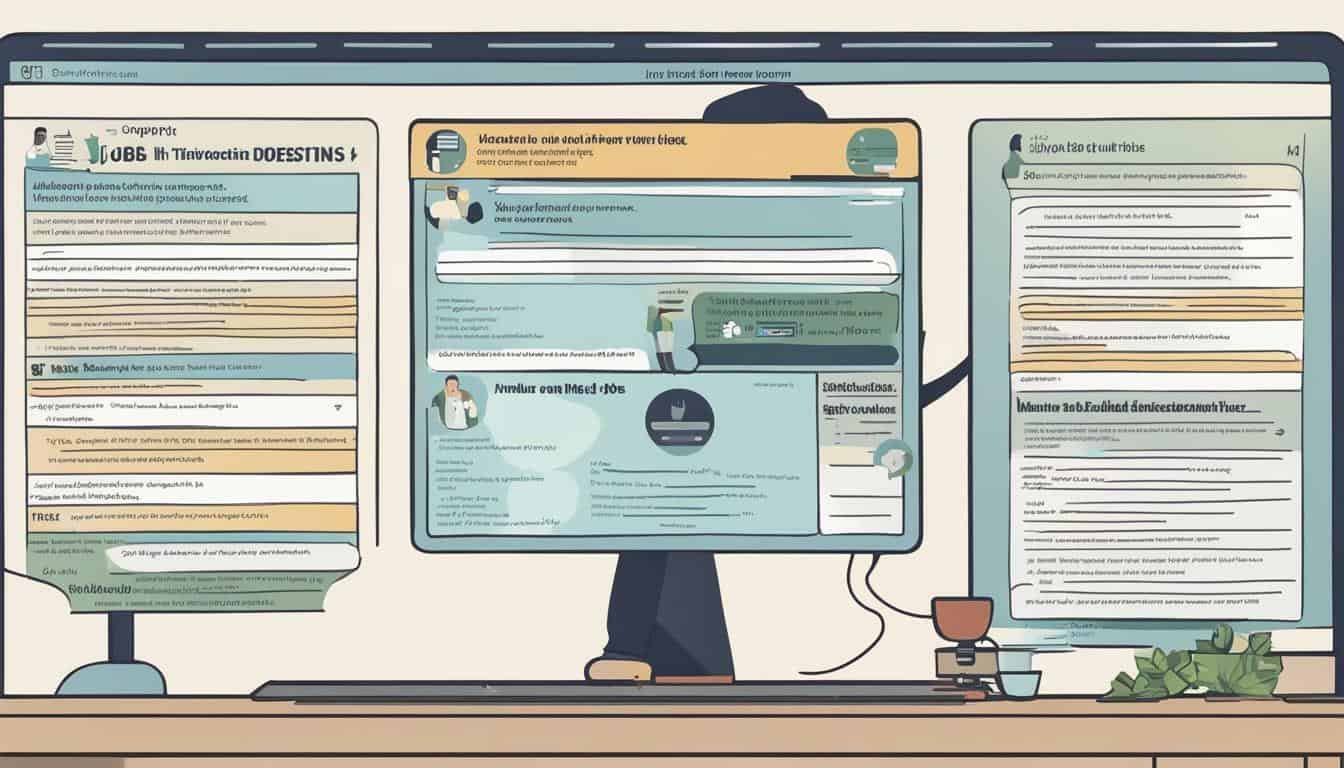In the upswing of remote work culture, we’ve embraced the mutual perks of skipping the daily commute and harnessing a global talent pool. Yet, as we navigate these modern work waters, it’s essential to anchor ourselves in an awareness of some of the choppy currents out there. Specifically, we’re talking about the few who misuse the trust surrounding remote job checks and remote job reimbursement to run scams.
Whether you’re coasting into remote job payment methods or just testing the waters, it’s prudent for us to dive deep into understanding what’s legit and what’s not. Join us as we unpack the tell-tale signs of bona fide remote job offers, sieve through the scams, and establish how real companies handle the financial side of equipping their remote employees.
As we set sail, remember: knowing is half the battle. Let’s ensure our voyage into remote work is as secure as it is liberating.
Understanding Remote Job Equipment Funding Policies
As we delve further into the digital era, the topic of remote job equipment is becoming increasingly pertinent. Companies are implementing a variety of policies to support their remote workforce’s needs, understanding that proper equipment is fundamental to productivity and job satisfaction. Whether they provide a stipend for home office essentials or adopt a BYOD (Bring Your Own Device) strategy, employers are actively refining remote job payment options and remote job expenses models, tailored to ensure a seamless transition into remote working lifestyles.
| Equipment Funding Models | Pros | Cons |
|---|---|---|
| Stipends for Home Office | Flexibility in selecting gear; ownership of equipment. | Potential out-of-pocket upfront costs; reimbursement process. |
| BYOD | No waiting period for equipment; familiarity with personal devices. | Mixing personal with work use; managing equipment wear and tear. |
| Company-supplied Computer | Optimized for job needs; no personal usage concerns. | Limited choice; may need to return upon job termination. |
| Full Suite of Equipment | Comprehensive work setup; often includes tech support. | Lacks personalization; potential delays in obtaining equipment. |
We must pay particular attention during the interview process to understand a potential employer’s policy regarding remote job expenses. Some may grant an allowance to cover the costs of sets from ergonomic chairs to state-of-the-art monitors—purchases that are, more often than not, tax-deductible for the company and a sustainable perk for the employee. Issues such as the need for backup devices or handling unplanned expenses are also topics that we should candidly discuss when addressing a remote role’s payment policies.
By examining these diverse strategies, we can advocate for ourselves and navigate the nuances of remote work’s financial logistics efficiently. Knowing whether we’ll be reimbursed, granted a stipend, or required to bring our own device can significantly affect our decision to take on a new role and our readiness to engage in remote work successfully. It is our responsibility, as prospective remote employees, to be proactive in our understanding of what support we’ll receive for remote job expenses, to ensure we can build and maintain a home office that keeps us competitive and complacent in the market.
Do Remote Jobs Send Checks for Equipment?

As we delve into the modern landscape of telecommuting, one question that often surfaces is, do remote jobs send checks for equipment? The straightforward answer is that while some remote jobs may offer to mail checks to cover the costs of setting up a home office, it’s increasingly common for companies to process such transactions through remote job direct deposit or remote job bank transfer. These methods are not only efficient but also add an additional layer of security for both the employer and the employee. Therefore, it’s important for individuals considering remote work to inquire about their potential employer’s remote job equipment policies. Some companies may have specific guidelines in place regarding which equipment they will cover and how they will disburse funds for such expenses. Understanding these policies beforehand can help employees make informed decisions about their remote work setup and ensure a smooth transition into their new remote role.
Falling victim to a scam under the guise of receiving equipment funds can be a harsh reality check—for lack of a better term. Scammers adeptly create the illusion of legitimacy, often issuing checks that are inevitably returned as fraudulent. Authentic employers, on the other hand, would typically verify expenses and use a more secure means to reimburse you, whether that’s through a bank transfer or a company-managed account.
We champion transparency, and it’s crucial that employees and job seekers ask about and understand the payment methodologies of their potential employers. Recognizing the difference between legitimate reimbursement for office equipment and deceptive practices is a key step in safely navigating remote employment opportunities. Always stay alert, confirm payment processes, and protect your financial interests from the sophisticated scams that pose as employment opportunities.
Remember, a genuine employer will never overcompensate you for equipment and then request that you wire the excess funds back to them or to a third party. Such practices, unfortunately, hallmark the scamming trade.
In conclusion, it’s not unheard of for companies to send checks to facilitate the purchase of home office equipment. However, the safer and increasingly prevalent methods include direct deposits or bank transfers. Stay informed, remain vigilant, and make sure your remote work journey is both productive and secure.
Identifying Legitimate Remote Work and Avoiding Scams
In our increasingly digital world, remote job opportunities have surged, opening the door wide to flexible work arrangements that are particularly appealing to those valuing work-life balance, such as college students. Yet, it’s critical for us to acknowledge that this growth has been shadowed by a rise in job-related scams adept at impersonating real job offers. It’s crucial for job seekers to be able to distinguish between legitimate remote job payment policies and deceptive traps set by scammers. These fraudulent schemes often send out counterfeit checks to cover fake remote job expenses, cleverly entrapping individuals to spend their funds on non-existent office supplies.
We firmly believe that due diligence is the first line of defense when identifying trustworthy remote work opportunities. Authentic remote job reimbursement procedures should never require us to make upfront payments for equipment or other job-related expenses. It’s prudent to use well-established payment methods and to avoid any transactions involving checks from unverified sources. Authenticating the employer through extensive online research and insisting on transparent communication about equipment funding policies are essential steps in verifying the legitimacy of remote job offers.
When safeguarding against fraudulent activity, it’s essential to heed our intuition and look for red flags that might suggest a scam. In our experience, a credible employer will not place us in a position where we are responsible for transferring funds to third parties or purchasing supplies from specific vendors without proper verification. Any request that seems out of the ordinary should raise immediate concern. In the case of suspicious activity, it’s beneficial to alert our bank and seek advice to prevent potential financial loss. By staying informed and aware of common scam strategies circulating in the remote job market, we empower ourselves to filter through offers, steering clear of deceit, and instead, securing legitimate and rewarding remote career paths.




0 Comments